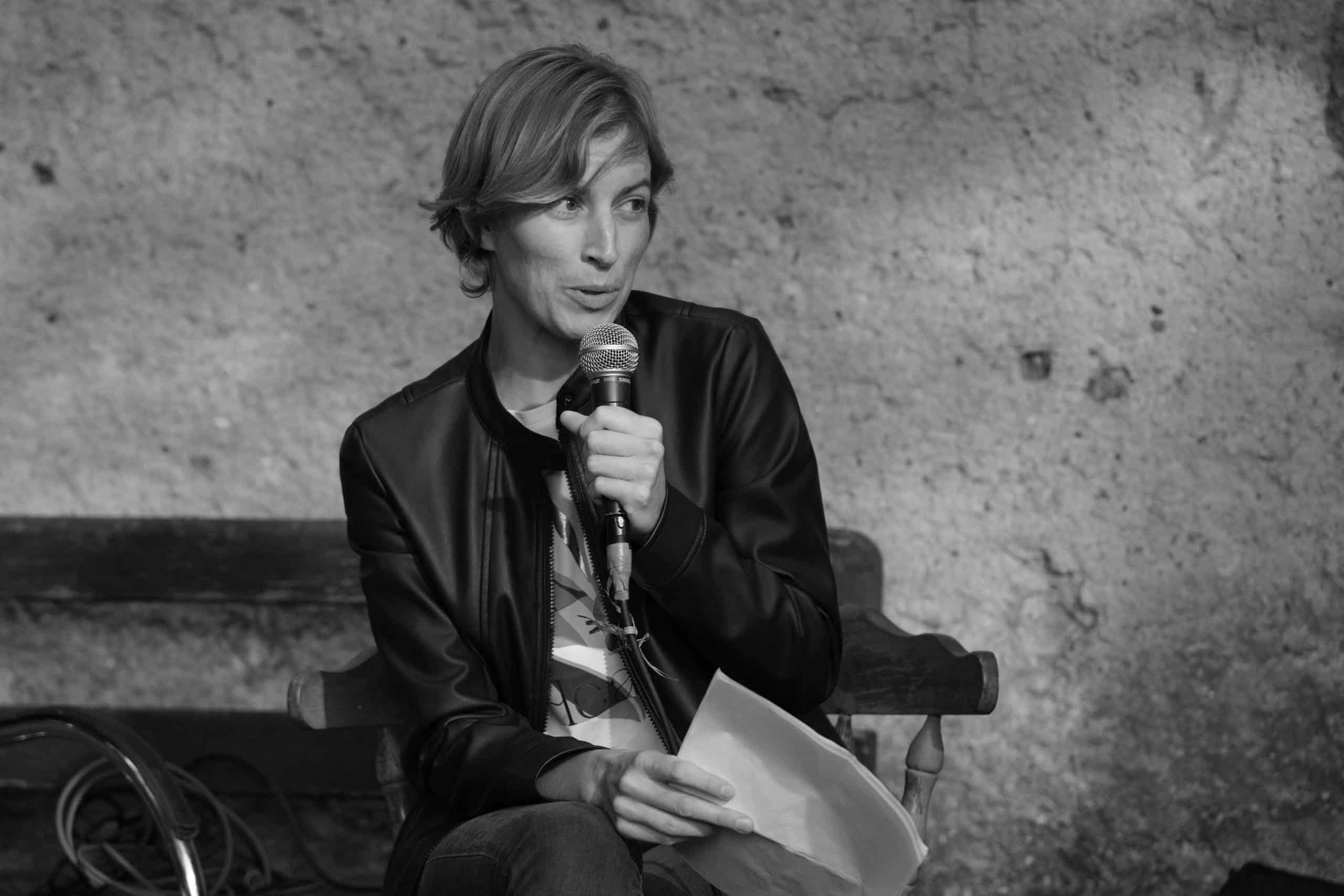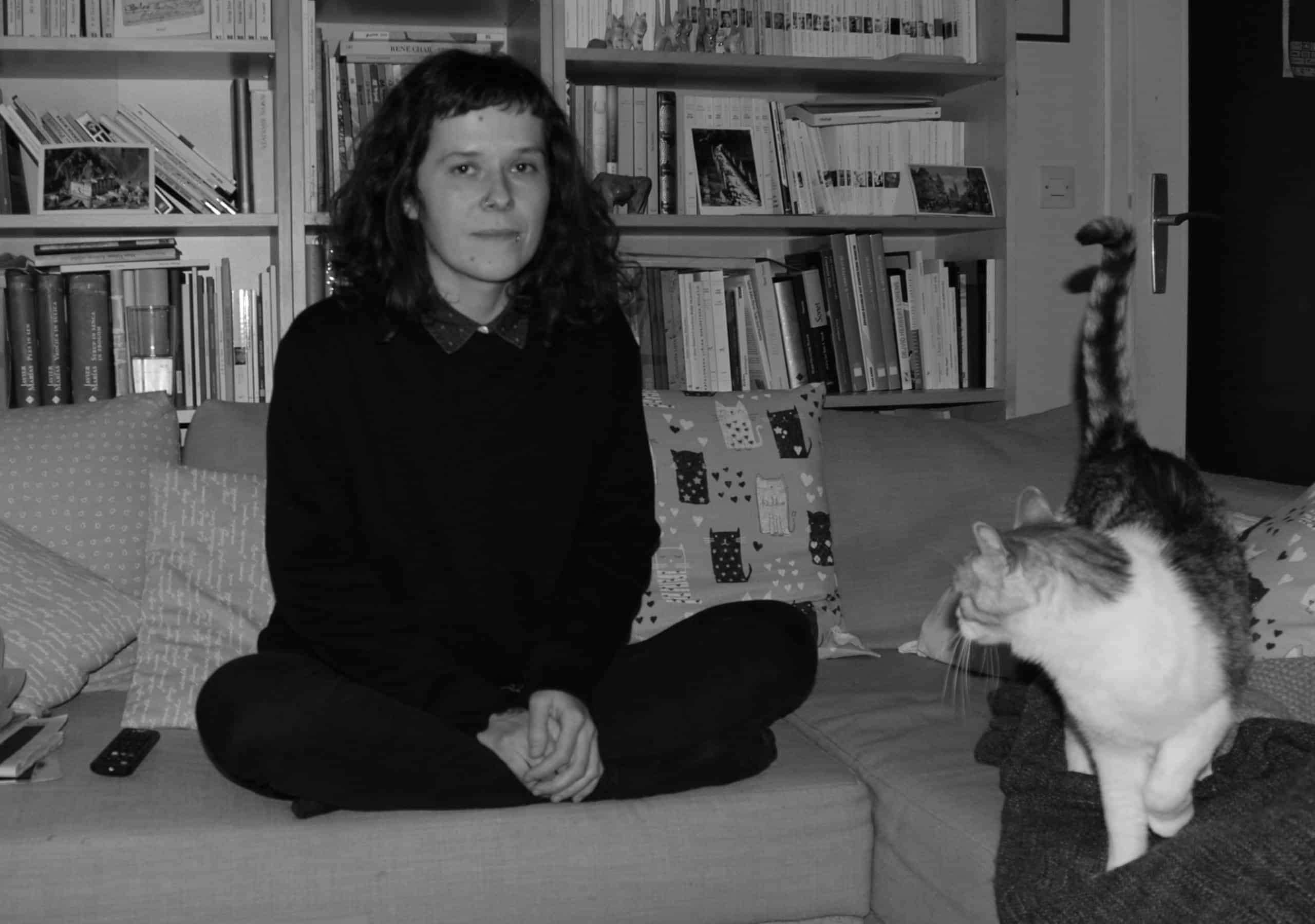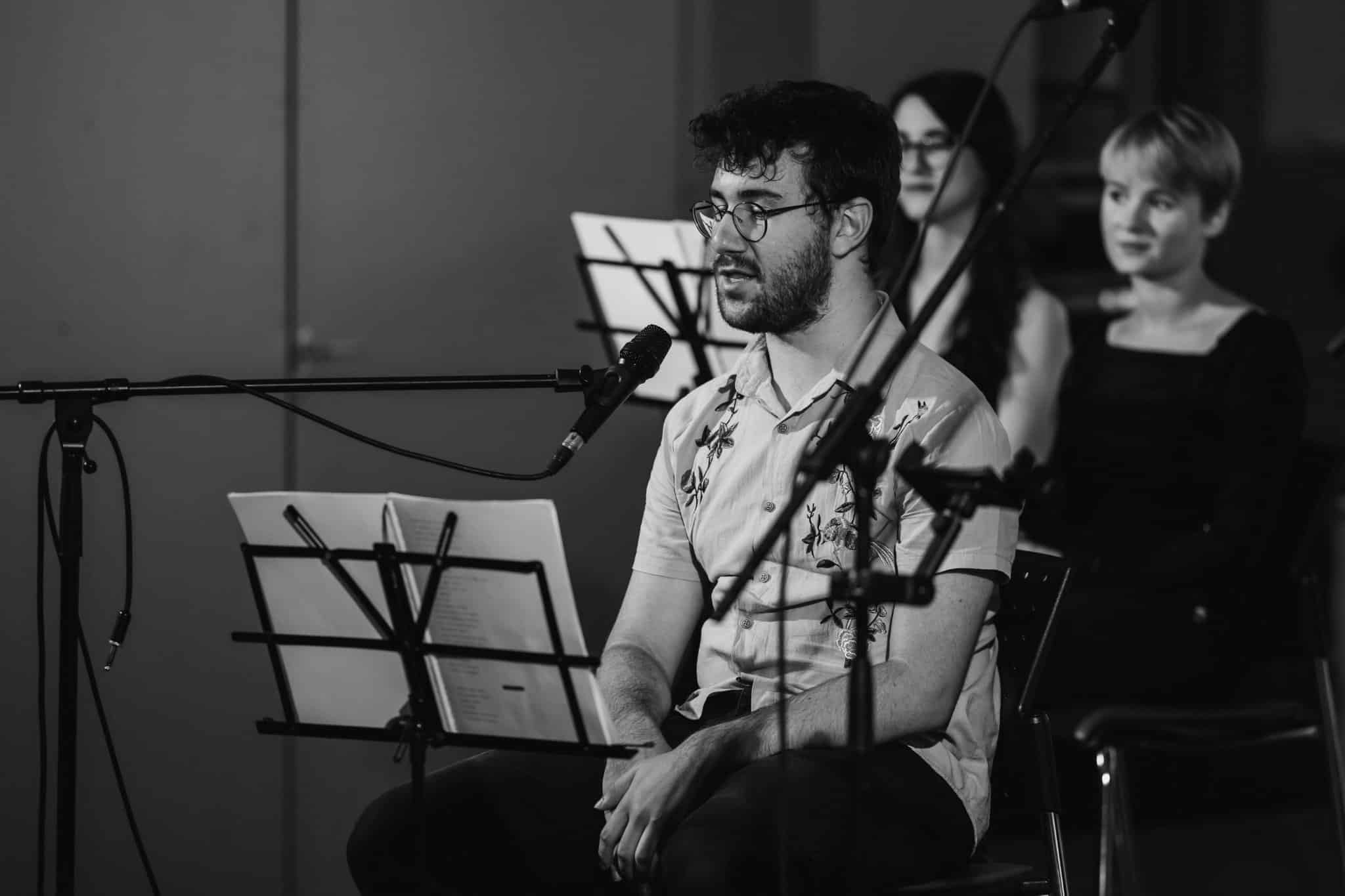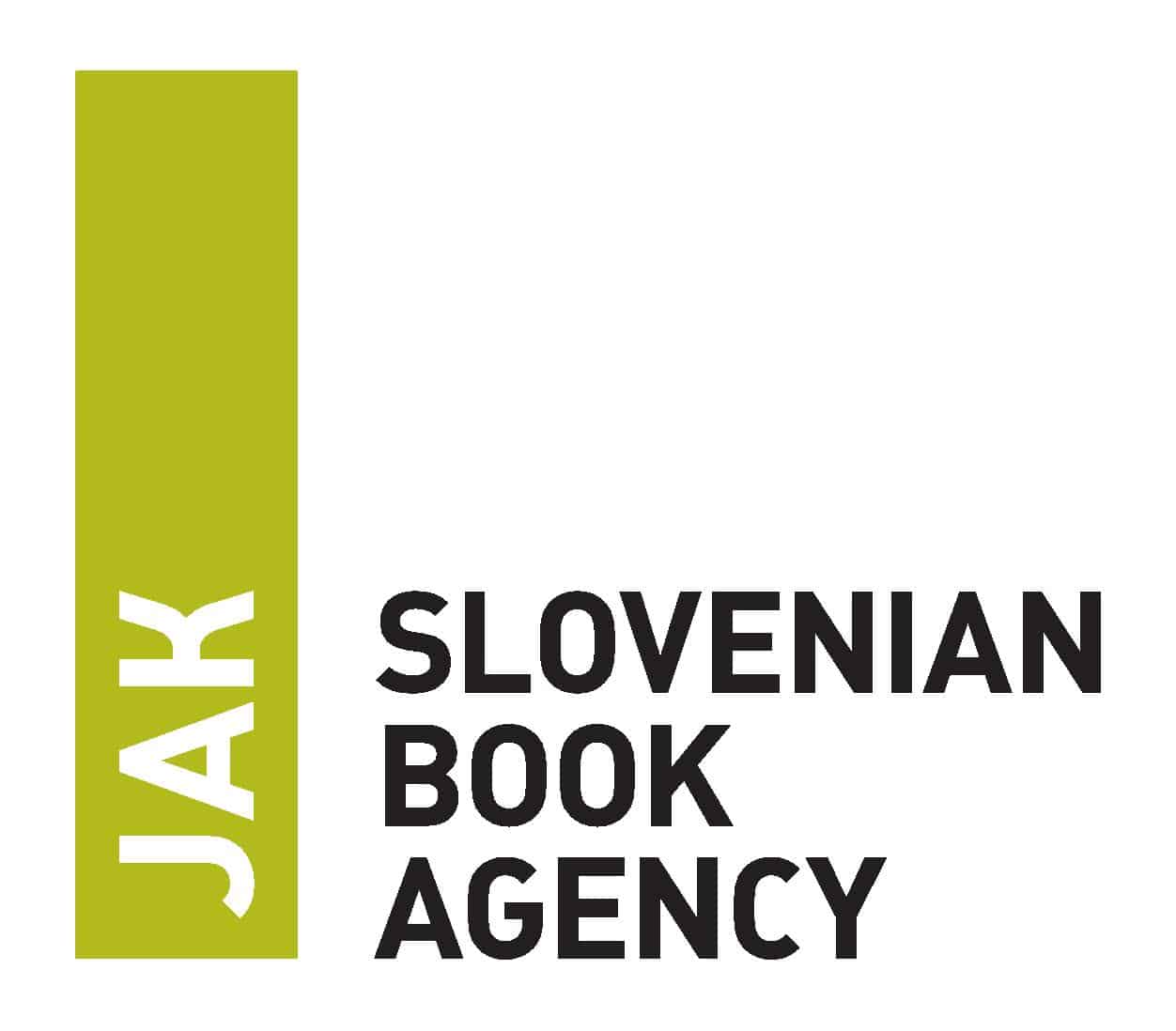The Ulysses’ Shelter 3 2023–2024 – Presentation of Slovenian Residents

Within the scope of the call for proposals to participate in the residency programme 2023–2024, under the project The Ulysses’ Shelter 3, the jury of three members, namely Kristina Kočan, Nataša Čebular and Tomo Podstešek, selected four Slovenian candidates to take part in the 2023–2024 residency programme.
The Slovenian Writers’ Association (SWA9 received 12 applications and chose the following four candidates:
Kaja Teržan

(C) Naško Križnar
Kaja Teržan (1986) grew up in Škofja Loka and Stockholm. She initially interrupted her studies of art history and sociology at the Faculty of Arts in Ljubljana and redirected her focus to the broader field of contemporary dance-performative practice. In 2015, her debut poetry collection “Delta” was published by the Center for Slovenian Literature, and it was also nominated for the Veronika Award in 2016. In 2018, she released the poetry collection “Krog” (“Circle”), which was nominated for the Kritiško sito Award. She received the Jenko Award for this collection. In 2021, her third collection “Nekoč bom imela čas” was published by the same publishing house. At the initiative of the Center for Slovenian Literature, she participated in international translation workshops in Vienna and Costa Rica with her poetry.
Currently, she has shifted her creative motivation towards writing short stories that are building towards a more extensive prose work, scheduled to be published in 2024 by KUD Police Dubove publishing house. In the same year, her children’s poetry book will be published by Mladinska knjiga in the Čebelica collection.
FROM THE REVIEWS:
Delta (CSK, 2015)
»Thus, her debut ‘Delta’ appears as a current frozen in time, yet at the same time, due to its stylistic versatility and freshness, like that of icy water on a scorching hot day, it is a truly dancing and moving collection.«
Veronika Šoster from the review “Nikoli se ne izliješ v isto delto dva krat,” LUD Literatura, 2016
»The poems are also a kind of impressions of smaller corners of Ljubljana; the rhetoric of space is convincing, as it forms individual image-impressions with impressions from nature, walks – these are like photographs of specific urban and rural points.«
Tonja Jelen from the review “Kaja, tebe je treba bilo,” Mentor, October 2016
Krog (CSK, 2018)
»The theme of home and the search for home appears with all existential and poetic sharpness in the collection ‘Krog’ (‘Circle’): first at the level of the aforementioned search for a ‘space of one’s own,’ and then also the search for a ‘space within oneself.’ The body, which in ‘Delta’ still functioned strongly and flexibly, here becomes a ‘transcribed body’ – the final support of a subjectivity yearning for solidity disintegrates and collapses before the reader’s eyes. All that remains are various discourses.«
Peter Semolič from the reflection “Telo in beseda telo” [Body and the Word Body][About the poetry of Kaja Teržan], Poiesis, 2019
Nekoč bom imela čas (CSK, 2021)
»The poetess remains a sharp and resolute fighter who doesn’t complain but steadfastly traverses silences and biases. As a tuned-in direct and irresistible speaker, she finally offers a meaningful continuation of the titular predicate. She states extremely clearly: One day I will have time. / I will scrape it together from all corners / and bathe in it. Because despite the fluid skipping between measured spaces, she confirms along the way: It’s impossible to control spaces, even if you’re as fluid as time.«
Martina Potisk from the review in Delo, 2022
»Nekoč bom imela čas’ is a resolute collection, extremely rebellious and deeply committed to poetry as a way of being. More than a poetic theory of relativity, it presents to us the practice of relevance. Earned and embraced presence: ‘Life loves me, I know. / All its rejections / frame the space that needs me.’ The time of her space has arrived; the present is no longer a temptation.«
Diana Pungeršič from the reflection on the book’s flaps, 2021
Ivan Antić

(C) Author’s archive
Ivan Antić (1981, Serbia) a short story writer, poet, and translator. He studied literature and philosophy in Belgrade and Ljubljana. He has published books of short stories: “Tonus” (Prva knjiga Matice srpske, 2009) and “Membranes, Membranes” (Kulturni centar Novog Sada, 2016). “Tonus” has been translated into Greek (Vakxikon, Athens, 2021), and “Membranes” into Slovenian (Cankarjeva založba, Ljubljana, 2020). Individual stories have also been translated into English, German, Polish, Romanian, Macedonian, and Albanian, and included in numerous anthologies, including “Iz jezika v jezik” (Ljubljana, 2014). The poem “Veter Then Cash” was included in the Slovenian anthology “The Word of Resistance” (2022). He translates literature and humanities from the Slovenian language (Zajc, Blatnik, Šalamun, Hrs Pandur, Sinanović, etc.). He received the Miloš N. Đurić award from the Serbian Association of Literary Translators for the best translation of 2020, for translating Dane Zajc’s poetry collection “Down Down”. In Slovenia, he participated in festivals like Vilenica, Literodrom, and Poetry at the Crossroads, as well as numerous readings organized by IGNOR. He has been living in Ljubljana since 2012.
FROM THE REVIEWS:
Tonus (Srbska matica, 2009)
»The poetic and literary-historical consciousness, as well as the ability to let the story unfold in an exciting manner, with a sense of breath and without excessive shouting, are all qualities that set Antić apart from the prose production of his generation. Antić skillfully navigated between the Scylla of naive and romantic notions of the writer as the Writer, and the Charybdis of equally perilous illusions of the writer as a socio-political worker, and accomplished what is the task of literature throughout all times – to provide relevant epochal answers to fundamental existential questions and issues.«
Marjan Čakarević
»We can also define stories as miniature novels. While reading the stories, we can’t help but remember the words of Mrs. Milovanović from Albahar: ‘It’s a shame his stories are so short. You’ve just stepped into them, become a part of them, and you’re already at the exit.’ We can’t help but recall her words, but we also can’t agree with them, as Antić hasn’t done any harm, quite the opposite. With this book, he introduced an entirely new sensibility into Serbian prose, and if there’s a golden rule for writing a story, he found it. He also found a solution to chatter and banality, and that is in the proper balance of words and silence.«
Jovana Davidović
Membrane membrane (Cankarjeva založba, 2020)
»Antić’s prose heals with exceptional thoughtfulness and spontaneous sensitivity. It doesn’t heal in the sense of forgetting, but rather it serves as a reminder that isn’t harsh, violent, or self-aggrandizing, as often happens in our region. Instead, it is healing because it contains the writer’s calling in the best sense of the word.«
Muanis Sinanović
Nežka Struc

(C) Ivan Dobnik
Nežka Struc (1987, Slovenija) is an anthropologist and poet. She has published two poetry collections: “Nihanja” (Wavers) (Hiša poezije, 2017) and “Do severnega sija” (To the Northern Lights) (Ignor, IA, 2021). In 2017, she co-translated the anthropological classic “Argonauts of the Western Pacific” by Bronisław Malinowski.
Since 2019, she has been more intensely engaged with questions related to the interpretation of poetry. This exploration has led to several spatial, vocal, and video interpretations of her own poetry. Her poems and short stories have been translated into Italian, Croatian, English, Serbian, and Czech. Her poetry was featured in the anthology “Srca v igri: Izbor leposlovnih del mladih slovenskih avtoric_jev LGBTQ+” (Hearts in Play: A Selection of Literary Works by Young Slovenian LGBTQ+ Authors) and in several literary magazines in Slovenia. In her role as a producer of literary events, programs, and festivals, she works at the UNESCO City of Literature office in Ljubljana. She is involved with the Pranger Festival, a gathering of poets, critics, and poetry translators, as well as the Poetry Tournament and Ignor, a platform for literature, sound, visual arts, and performance.
FROM THE REVIEWS:
Nihanja (Hiša poezije, 2017)
»One of the outstanding and thus defining characteristics of these poems is the ironic portrayal of human actions and their consequences, which, while not particularly commendable, are an integral part of life in human society.«
»What is particularly striking in the poems is the connection to insights gained from recurring events, lending the poems a ballad-like quality, as the chosen events are mostly of tragic origin, even dark and grim, often originating from well-known motifs of folk songs but transformed f
or contemporary use.«
Andrej Lutman, ARS
Ubežati sopari, Do severnega sija (Literarno društvo IA, Ignor, 2021)
»Nežka Struc’s second poetry collection, ‘Towards the Northern Lights,’ published in collaboration between Ignor and Literary Society IA, is an attempt at a journey towards a goal that the reader encounters already in the title. But slowly, we haven’t even boarded the train yet. We begin in the garden. Recently, it seems, the garden has become a graveyard with a cat falling through the window. Landing in the garden is significant. It’s a place we return to for solace.
‘Towards the Northern Lights’ is a weaving of poems that fracture at seemingly wrong places, deliberately reversing word order, sometimes stuttering in the repetition of the same words. The poet states that she intentionally defines herself slightly wrong. The poems are interrupted by prose passages that impose a narrative structure on them.«
Lucija Klauž, Radio Študent
Aljaž Primožič

(C) LR Photography
Aljaž Primožič (born 2001) is a Slovenian poet and playwright currently pursuing his studies in Russian Studies and Philosophy at the University of Ljubljana. His poetry has been translated into Russian, German, and Serbian. Last year, his poetry debut Čisto potiho was published by the publishing house LUD Literatura. The critically acclaimed book quickly sold out within months, making it one of the most sought-after poetry collections in the country. In 2020, his dramatic debut, Kamenčki, made its appearance in the anthology Tapetka!, published by the publishing house of the Public Fund of the Republic of Slovenia for Cultural Activities (JSKD RS). A year earlier, he adapted the poetry collection Trpljenje mlade Hane (The Sorrows of Young Hana) by Katja Gorečan for a stage production, and he has worked on several projects with the Slovenian National Drama Theatre in Ljubljana. Since 2018, he has been the assistant artistic director of the Izrekanja literary festival, which is committed to bringing together different forms of performance poetry. In previous years, he has also performed at the festival with theatre-poetry performances of his own work, as well as the work of other poets.
FROM THE REVIEWS:
Čisto potiho (LUD Literatura, 2022)
»Very quietly, an adept hand has evidently written, before us lies a sovereign collection, which asserts and proves itself on multiple levels, but it’s particularly worth highlighting the sense for surprising (simple) images, narrative and confession, poetic structure, measure, or rather their mutual harmony. Although the poems differ in formal approaches, they usually share a common multitude – a fundamental internal coherence.«
Diana Pungeršič, LUD Literatura
»The poems emerge against the backdrop of arrival, departure, growing up, solitude, passing. Right from the start, they speak of spontaneous mutual closeness and distancing, of small peculiarities and the embarrassments of the “infamous everyday”, reduced to the question, “how much do I actually lose/when I’m losing”. /…/ Coming to the forefront are continual touches, small details, movements and gestures, which the poet meaningfully weaves into a unique garland.«
Martina Potisk, Delo
Kamenčki (v Tapetka! : petič pet dramskih besedil za otroška in mladinska gledališča na tapeti, Javni sklad Republike Slovenije za kulturne dejavnosti, 2020)
»In addition to poetry, Aljaž Primožič also writes drama, in which themes of growing up and reminiscence are similarly present. In the play “Kamenčki” (“Pebbles”), the author also delves into the themes and issues of the LGBT community. The author alternately employs personal confessions in the play, creating a sense of closeness and connection, and journalistic stories about attacks on the LGBT community. These stories transition from personal issues to tragic tales of the murders of young members of this community. The teenage language and the youthfulness of the dramatic characters provide a somewhat different perspective. Despite the apparent indifference and universality of the dramatic characters (their names are not provided, only microphones, reporters, echoes, and voices are heard), the stories deeply shake us as Primožič employs a kind of confessional intimacy that perhaps brings readers even closer than individual identification or character descriptions would.«
Rina Pleteršek, Delo



